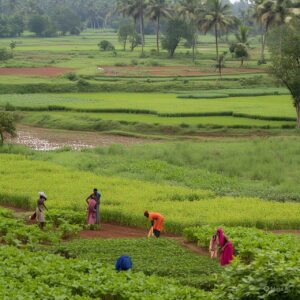
Organic farming in Kerala has seen a significant transformation over the past decade. With a strong emphasis on eco-friendly, chemical-free, and sustainable agriculture, the state has become a role model in India’s organic movement. Farmers, consumers, and policymakers are increasingly turning to natural farming methods that prioritize soil health, biodiversity, and long-term sustainability.
Why Kerala Is Embracing Organic Farming
Kerala’s shift towards organic farming is driven by a combination of tradition, awareness, and necessity. The state has a long-standing history of agrarian practices that were inherently sustainable. However, the Green Revolution brought chemical-intensive farming, which over time degraded the soil and health of ecosystems.
Today, there’s a renewed focus on reviving chemical-free farming techniques through composting, crop rotation, and permaculture. The awareness around healthy food and environmental protection has motivated many farmers to transition from conventional to organic farming.
Key Features of Organic Farming in Kerala
Organic farming in Kerala is characterized by several key practices that differentiate it from conventional methods:
-
Chemical-free soil nourishment using compost, green manure, and natural fertilizers
-
Pest and disease management with herbal extracts and bio-pesticides
-
Crop rotation to prevent soil depletion and promote biodiversity
-
Water conservation through rainwater harvesting and micro-irrigation
-
Permaculture techniques to replicate natural ecosystems on farms
These sustainable techniques ensure long-term soil health, high nutritional value of produce, and minimal harm to local ecosystems.
Government Initiatives Supporting Organic Farming
The Kerala government has actively promoted eco-friendly agriculture through policies, subsidies, and training programs:
1. Kerala Organic Farming Policy
The policy encourages farmers to adopt organic practices by offering support in certification, education, and marketing. The government’s goal is to make Kerala fully organic in the long run.
2. Subsidies and Incentives
Farmers receive financial aid for purchasing organic inputs like compost, neem-based pesticides, and bio-fertilizers. There are also grants for setting up vermicomposting units and biogas plants.
3. Training and Awareness Programs
Initiatives such as Jaivakarshika Samrambham help educate farmers about green agriculture, certification processes, and market opportunities for organic produce.
Organic Farming Techniques
1. Composting
Composting is a natural process of recycling organic matter into rich fertilizer. In Kerala, farmers use kitchen waste, coconut husk, leaves, and cow dung to produce compost.
-
Restores soil nutrients
-
Improves microbial life
-
Reduces dependence on chemical inputs
-
Supports sustainable, eco-friendly cultivation
2. Crop Rotation
This age-old technique involves alternating crops each season to maintain soil health and prevent pest cycles.
-
Enhances nutrient availability
-
Supports biodiversity
-
Lowers weed and pest pressure
-
Improves yields over time
3. Permaculture Practices
Kerala’s climate and terrain are ideal for permaculture, which involves designing agricultural ecosystems modeled on nature.
-
Integrates animals, crops, and natural water sources
-
Encourages zero-waste farming
-
Supports local biodiversity
-
Minimizes external inputs
Benefits of Organic Farming:
1. Improved Soil Health
Without the use of chemical fertilizers, organic farming revitalizes the soil with organic matter and microbes, ensuring long-term fertility.
2. Chemical-Free, Safe Food
Consumers are increasingly choosing organic products to avoid pesticide residues. The food is richer in nutrients and free from harmful chemicals.
3. Environmental Sustainability
Organic methods reduce water pollution, increase green cover, and promote wildlife protection. The reliance on natural processes makes the ecosystem more resilient.
4. Market Potential and Premium Pricing
The demand for organic food is rising in cities like Kochi, Thiruvananthapuram, and Bengaluru. Farmers who sell certified organic produce often get better prices, boosting their income.
Challenges Faced by Farmers:
While the benefits are numerous, there are challenges that Kerala’s organic farmers still face:
-
High initial investment in transitioning farms
-
Time-consuming certification process
-
Limited market access in remote areas
-
Short shelf-life of fresh organic produce
-
Lack of widespread awareness among consumers
Despite these hurdles, continuous support from the government, NGOs, and cooperatives is helping overcome these barriers.
Role of Local Communities and Youth:
Kerala’s organic farming movement is not limited to professional farmers. Students, homemakers, and urban residents are also embracing natural farming:
-
School gardens teach children about eco-friendly cultivation
-
Terrace farming and kitchen gardens are growing in cities
-
Organic bazaars organized by local groups bring farmers and consumers together
-
NGOs and startups are training youth in green entrepreneurship
This wide involvement has turned organic farming into a grassroots movement.
Success Stories:
-
In Wayanad, tribal farmers are leading the way in organic pepper and turmeric farming, now in demand globally.
-
Kudumbashree women’s groups are growing pesticide-free vegetables and selling them through cooperative networks.
-
In Palakkad, entire villages are moving toward organic paddy cultivation, reducing health risks and reviving local water bodies.
These success stories highlight the power of community-led sustainable farming.
Future of Organic Farming in Kerala:
The path ahead is promising for Kerala’s organic revolution:
-
Digital marketing will connect farmers directly with consumers
-
Agro-tourism based on organic farms will attract eco-conscious travelers
-
Expansion of permaculture models in hilly and coastal areas
-
Investment in cold storage and logistics will reduce post-harvest losses
-
More research and development in organic input production
With sustained effort, Kerala can become a model for organic agriculture not just in India but globally.
Conclusion
Organic farming in Kerala is a perfect blend of tradition, innovation, and eco-consciousness. Through practices like composting, crop rotation, and permaculture, Kerala is promoting biodiversity, enhancing soil health, and ensuring chemical-free food for its population. While challenges remain, the growth trajectory is clear. With continued investment, awareness, and community support, Kerala is well on its way to becoming India’s organic farming capital.
